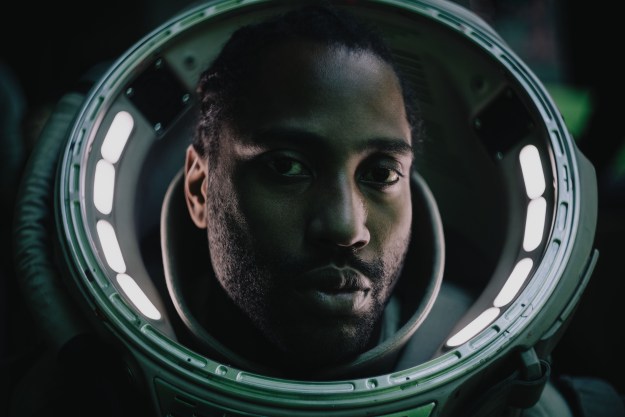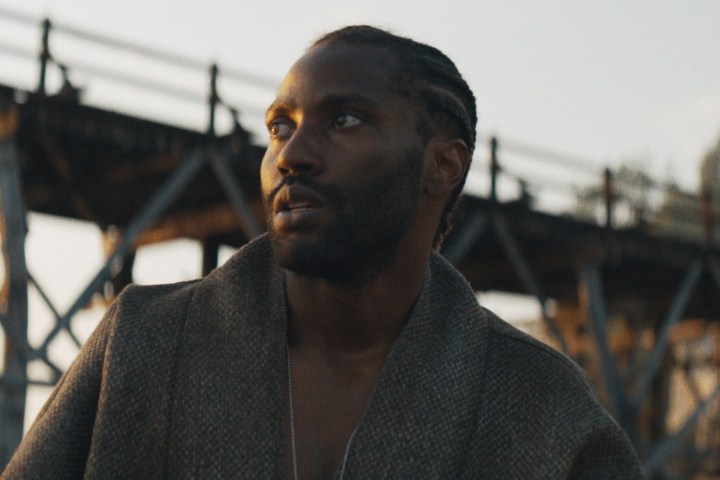
“The Creator is a visually stunning but frustratingly shallow sci-fi epic.”
- Greig Fraser and Oren Soffer's visually stunning cinematography
- Gareth Edwards' confident, maximalist direction
- A propulsive, engrossing third-act base attack
- An overstuffed plot
- Numerous disjointed scenes throughout
- A cast of one-note characters
- Too many ideas left unexplored and forgotten
The Creator, which hits theaters this week, is coming at both the worst and best possible time. The film, director Gareth Edwards’ first since 2016’s Rogue One: A Star Wars Story, was made on a limited $80 million budget using a location-first, effects-later shooting style that made it easy for its filmmaker and his crew to produce it for a comparatively smaller cost than almost every other modern blockbuster like it. You wouldn’t know just by watching it that it cost less to make The Creator than Ant-Man and the Wasp: Quantumania, Guardians of the Galaxy Vol. 3, and Indiana Jones and the Dial of Destiny, either, all of which reportedly cost north of $200 million to make.
The Creator not only looks better than all of those films, but it emerges over the course of its overstuffed 133-minute runtime as Edwards’ most visually accomplished effort to date. Anyone familiar with his previous films — Rogue One, 2014’s Godzilla, and 2010’s Monsters — will know how high of a compliment that is. From a purely technical standpoint, the film is impressive enough to potentially change the way that most Hollywood studios make their blockbuster titles and open the door for more filmmakers to get to play around in the $50-$80 million range. For these reasons alone, The Creator feels like a necessary counterargument to the beliefs and methods that have driven blockbuster budgets to obscene heights over the past decade.
On the other hand, the film’s bullish, simplistic sentiments regarding the emergence of artificial intelligence make it come across as no sci-fi film should: mind-bogglingly shortsighted. There is, perhaps, no moment in it that is more representative of its narrative and philosophical shortcomings than when a billboard of a well-known actress is presented in its second act that reads, “Donate your likeness. Support the AI cause!” On paper, that might seem like a biting piece of social commentary — until you realize that The Creator very much supports its own, self-proclaimed AI cause.

The Creator begins with, of all things, a vintage newsreel. Across its opening minutes, the film chillingly lays out the timeline of its alternate reality — namely, how artificial simulants were first welcomed into American society before one supposedly robot-run nuclear attack on Los Angeles brought that peaceful period to an end. By the time its newsreel concludes, the film has effectively set the stage for the ongoing war between the pro-AI citizens of New Asia and the U.S. military, which lords its nuclear power over the world via a bomb-dropping space station known as NOMAD. It’s only a few minutes later that NOMAD’s capabilities are demonstrated in a sequence that irrevocably tears The Creator’s hero, an undercover U.S. operative named Joshua (John David Washington), away from his pro-AI wife, Maya (Gemma Chan).
Years later, Joshua is ambushed by a pair of high-level military officials, Colonel Howell (Allison Janney) and General Andrews (Ralph Ineson), who inform him that an AI inventor known only as “Nimata” has created a new weapon powerful enough to permanently end the war between the U.S. and New Asia. His superiors convince Joshua to track down Nimata and the mysterious weapon with the promise that doing so will reunite him with Maya, who was recently spotted in satellite footage wandering around New Asia. His mission is complicated, however, when he comes face-to-face with Nimata’s latest weapon, an AI child named Alphie (Madeleine Yuna Voyles), who has the power to disable nearby technological devices and weapons.
As Joshua continues his search for Maya, he slowly bonds with Alphie. At the same time, The Creator bounces from one set piece to another — delivering action sequences set in the jungles and rice fields of New Asia that feel inevitably reminiscent of images produced during the Vietnam War. Its opening newsreel footage, as well as its wholehearted condemnation of America’s reactionary military practices, similarly make The Creator’s allusions to the post-9/11 Iraq War unavoidably clear. Unfortunately, the film doesn’t know what to do with any of these connections, outside of emblazoning all of its tanks and bombs with blatant U.S. military labels and repeatedly hitting viewers with images of its Asian actors being brutally killed.

The film, which was photographed by Oren Soffer and Dune cinematographer Greig Fraser, is a visually rich, relentlessly entrancing sci-fi epic. Beyond the beauty of its colorful frames and guerrilla-style, on-the-ground compositions, though, there’s little to grasp onto. The Creator is a cynical takedown of the military-industrial complex that paints nearly all of its American characters as tyrannical, brutish war criminals while offering its Asian characters very little interiority or space to exist free of its carnage. Edwards’ decision to shoot the film primarily on location in Thailand gives it a beauty that is impossible to deny but it also makes the film’s numerous instances of violence against the Asian bodies featured throughout it feel thoughtless and indiscriminate.
Ultimately, The Creator doesn’t engage with the actual culture and people of its setting deeply enough to make its visual fascination with Southeast Asia feel anything more than voyeuristic. Its relentlessly fast-paced editing style, meanwhile, leaves many of its conversations and non-action sequences feeling strangely disjointed and incoherent. The film has no perceptible rhythm, and by the time it has reached its third act, which forces its characters to run back and forth across amazing distances, it’s difficult to ignore the growing feeling of puzzle pieces being forced into place. The result is a film that feels simultaneously overstuffed and trimmed within an inch of its life.

The Creator is a sci-fi thriller awash in contradictions. It is, at once, a film made by a director whose last movie was effectively taken away from him and who has returned with a creative strategy to ensure that no studio ever feels the need to rip his vision apart again. And yet, it’s also a film that hails the merits of total assimilation. Even worse, it’s a movie filled with contempt for the systems that tend to crush anyone who stands in their way, but which seems unaware of its own nihilistic streak.
It’s a flawed creation, one incapable of clearly communicating its own ideas, but that doesn’t mean it should be altogether ignored. Even if the film itself is lackluster, the path it has laid for future blockbusters is one that demands to be pursued. The filmmakers who do may very well return with genre exercises that have more to offer than The Creator. In that sense, the most tragic thing about the movie may not be its own shortcomings, but the fact that it’s already destined to be outdone by those who follow in its footsteps.
The Creator is now playing in theaters. If you want to know more about the film, please read The Creator‘s ending, explained.
Editors' Recommendations
- 10 best 2010s sci-fi movies, ranked
- Like Dune: Part Two? Then watch these 5 great sci-fi movies right now
- 3 great sci-fi movies you need to watch on New Year’s Eve
- 5 best sci-fi movies from the past 5 years you should watch right now
- 3 sci-fi movies on Tubi you need to watch in October



